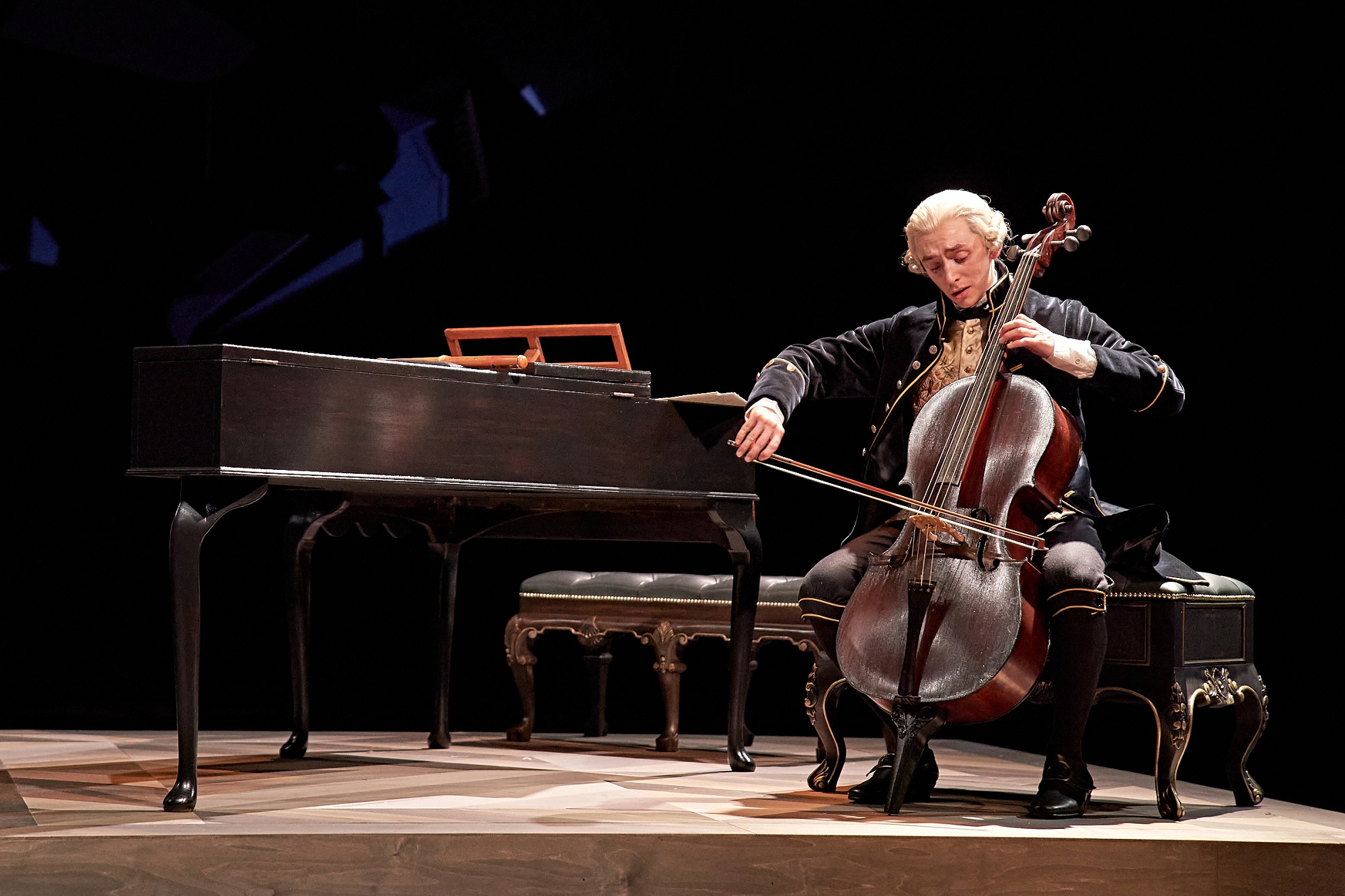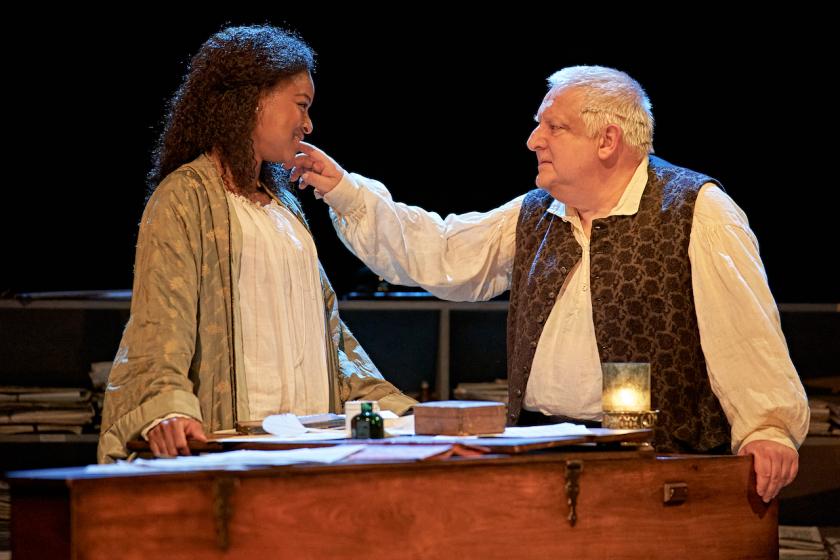In John Eliot Gardiner’s magnificent wide-ranging biography of Bach, Music In The Castle of Heaven, he tells the story of the composer’s early run-in with a bassoonist with his typical zest for detail. “[H]e called him a Zippel Fagottist. Even in recent biographies this epithet continues to be translated euphemistically as a ‘greenhorn’, a ‘rapscallion’, or a ‘nanny-goat bassoonist’ whereas a literal translation suggests something far stronger: Bach had called Geyersbach ‘a prick of a bassoonist’.”
Nina Raine’s spiky, heartfelt account of the fraught relationship between Bach (main picture), his family, and the world in general confronts the paradox of a man whose personality was as divisive as his music is transcendent. The sheer range of Bach’s repertoire – he wrote more than 1000 pieces in his lifetime – means he inevitably represents different things to different people.
Yet whether it’s the aching beauty of the "Erbarme Dich" from the Matthew Passion that particularly resonates with you, the celestial brilliance of Goldberg 28, or that music off the Hamlet cigar ad, part of the pleasure is the way it balances rationality with stunningly compressed emotion. The punch then, of a script – which like Gardiner, excavates the chaos and tragedy of Bach’s life – is to realise that the sublime abstraction of his music was as much of an escape for him as it has been for any of us.
The first coup-de-théatre of Nicholas Hytner’s production is when you walk into the auditorium; Vicki Mortimer’s design reveals an array of airborne harpsichords and fortepianos (collective noun "a cadenza"?) hovering like prehistoric birds over the stage. Soon Simon Russell Beale’s waspish Bach is revealed – a maniacal perfectionist intolerant variously of his family’s desire to sleep; the failings of his musicians "he’s multi-talentless"; and the debauched decadence of his employers.
What’s fascinating about Raine’s writing is that it manages, without pretence, to investigate how an abstract discipline like music evokes the mess of life. No human is a hero to their children, so it’s amusingly instructive as we watch Bach teach two of his sons (Carl Philipp Emanuel and Wilhelm Friedmann) the art of fugue at the same time as they rib him for his impatience. Would Bach have enjoyed the comparison of a fugue to a trifle, working as well horizontally as it does vertically, or was the excitement more mathematical? What were his thoughts on the particular moods of keys; was it a provocation to write the Goldbergs mostly in the apparently dull key of G major, as much as it was a heartfelt confession to mourn his first wife in a Chaconne in D minor?
We know much more about Bach than we do about Shakespeare, not least due to what his sons wrote about him. Yet as with Shakespeare we know none of it from his work – he sublimated his life completely into the discipline of a music that itself was dedicated to the greater glory of his Lutheran God. When he’s explaining music to his son Gottfried, he explains how "these same musical proportions are found in the distances between the orbits of the planets. So they are making music too…the music of the spheres. And the only reason, Gottfried, that we can’t hear it is that we have been hearing music from the moment we are born."
 Yet Bach’s God was repeatedly cruel to him; while he fathered 20 children with two wives, only 10 of those children even made it to adulthood. Right from the start we see that where he escapes from this tragedy into music, his wife Barbara – played with both empathy and humour by Pandora Colin – must carry the emotional as well as the physical weight of this. Meanwhile his sons must negotiate for his affections through their fugue techniques. His clear favourite, Douggie McMeekin’s lazy, charismatic Wilhelm, is blessed with the occasional flash of genius, but Samuel Blenkin’s sensitive, emotionally intelligent Carl (pictured above) – a real production highlight – must suffer repeated belittlement.
Yet Bach’s God was repeatedly cruel to him; while he fathered 20 children with two wives, only 10 of those children even made it to adulthood. Right from the start we see that where he escapes from this tragedy into music, his wife Barbara – played with both empathy and humour by Pandora Colin – must carry the emotional as well as the physical weight of this. Meanwhile his sons must negotiate for his affections through their fugue techniques. His clear favourite, Douggie McMeekin’s lazy, charismatic Wilhelm, is blessed with the occasional flash of genius, but Samuel Blenkin’s sensitive, emotionally intelligent Carl (pictured above) – a real production highlight – must suffer repeated belittlement.
Russell Beale evokes the wit, the intellectual rigour and the sheer bloody-mindedness of the composer in a performance that’s simultaneously etched with his suffering. When – courtesy of his son Carl, who has become a composer to Frederick the Great – he is invited to the Prussian court, the king casually lets slip that his son Gottfried has died. Externally Russell Beale’s Bach must maintain his composure. Yet in the mere slump of his shoulders there’s the sense of a world imploding.
All the music has been pre-recorded for the production by the phenomenally talented Voces8 and the SDG ensemble – a necessity during this time of Covid, given restrictions on numbers of both performers and audience members. So it’s not a niggle so much as an expression of curiosity to wonder whether the evening as a whole might be lifted by being performed with live musicians – so that we might experience an undistilled reminder of how his music stitches together hope and harmony out of discord and despair.
Yet overall this is a wonderful ensemble piece – and while Bach, contrary to his rules for fugue, emerges as the strongest voice, there are many performances to enjoy. Racheal Ofori plays his second wife Anna Magdalena with dignity and warm humanity, while as Frederick the Great, Bollywood star Pravessh Rana displays both a compelling stage presence and a rich humour.
You are left with the feeling that while it is immensely difficult to dramatise genius, this is a deeply intelligent and humane investigation of what drove and defined the man who has left us such a profound cultural legacy. It may be necessary to go straight home and put on Bach’s Cello Suites to process the immensity of what he was forced to survive. But this is a revelatory encounter; a modern and defiantly unhagiographical glance at a man who for all his frustrations and setbacks is more influential almost three hundred years after his death than he was in his lifetime.















Add comment